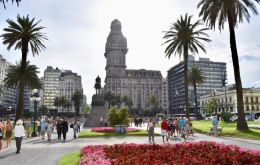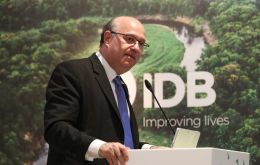MercoPress. South Atlantic News Agency
Economy
-
Wednesday, May 15th 2024 - 19:20 UTC
Lula orders major reshuffle at Petrobras' helm

President Luiz Inácio Lula da Silva has ordered a reshuffle at the top of Brazil's state-run oil company Petrobras, with Magda Chambriard replacing Jean-Paul Prates as CEO, Agencia Brasil reported. Following the head of state's decision late Tuesday, the board of directors approved the early termination of Prates' term Wednesday morning. In the meantime, and until Chambriard takes office, Corporate Affairs Executive Director Clarice Coppetti has been appointed on an interim basis.
-
Wednesday, May 15th 2024 - 16:58 UTC
Milei celebrates inflation figures football-style

Argentine President Javier Milei became overtly extrovert on social media Tuesday after the National Institute of Statistics and Census (Indec) announced that April's monthly Consumer Price Index (CPI) had stood at 8.8%. “GOOOOOOOOOOOOOOOOOOOL...!!!!,” he wrote in football-fan mode. Meanwhile, Presidential Spokesman Manuel Adorni said inflation had “its death certificate signed.”
-
Wednesday, May 15th 2024 - 16:45 UTC
Brazil allows unrestricted entry of international donations and used equipment for Rio Grande do Sul

Given the calamity conditions in the southern state of Rio Grande do Sul, because of the floods and prospects of further rainfall, leaving at least two million people displaced, the government of Brazil has allowed the unrestricted entry of international donations into RGdoS for the ensuing 30 days.
-
Wednesday, May 15th 2024 - 10:33 UTC
Uruguay leads in Latin America by far in the Good Government Index

The Chandler Institute of Governance (CIG) is launching the fourth edition of the Chandler Good Government Index (CGGI) this Wednesday, live from London with an event featuring Julia Gillard AC, Australia’s 27th Prime Minister. The performance Index shows Uruguay clearly rose in Latin America, on the “Leadership and Foresight, and Attractive Marketplace” pillars.
-
Tuesday, May 14th 2024 - 23:05 UTC
Argentina: Inflation keeps decelerating in April

Argentina's National Institute of Statistics and Census (Indec) Tuesday announced that April's Consumer Price Index (CPI) stood “at 8.8% in April 2024 compared to March and 289.4% year-on-year.” The government agency also noted in its X account that “they accumulated an increase of 65% in the first quarter.”
-
Tuesday, May 14th 2024 - 20:51 UTC
BRICS Bank comes to Rio Grande do Sul's rescue

The Shanghai-based New Development Bank (NDB) will grant funding worth R$ 5.7 billion (US$ 1.1 billion) to rebuild the Brazilian State of Rio Grande do Sul still grappling to recover from the unprecedented storms since April 29, Agencia Brasil reported Tuesday. The NDB, also known as the BRICS Bank, will release the money through a partnership with the Banco do Brasil (BB), the National Bank for Economic and Social Development (Banco Nacional de Desenvolvimento Econômico e Social - BNDES), and the Regional Development Bank of the Far South (Banco Regional de Desenvolvimento do Extremo Sul - BRDE).
-
Monday, May 13th 2024 - 20:45 UTC
Argentina passes IMF test with flying colors, will get US$ 800mn

After passing the eighth review of its debt refinancing program with the International Monetary Fund (IMF), Argentina is expected to receive a US$ 800 billion disbursement in the coming weeks, it was announced Monday. However, the transaction still needs to be approved by the IMF Board of Directors.
-
Monday, May 13th 2024 - 20:09 UTC
Paraguayan beef granted entry into Canadian market

Canada's Food Inspection Agency (CFIA) greenlighted the entry of Paraguayan meat into their market with nine packing plants already authorized to start shipments. Paraguayan President Santiago Peña celebrated the good news with postings on social media. “I congratulate all the institutions and sectors involved for this important achievement,” he wrote.
-
Monday, May 13th 2024 - 19:38 UTC
Brazil's Central Bank ups expansion forecast for 2024 to 2.09%

According to the latest issue of the Focus bulletin released Monday by Brazil's Central Bank (BCB), the economy in South America's largest country will grow by 2.09% this year, which represented an improvement from the previous 2.05% forecast, Agencia Brasil reported. The study also foresaw a yearly inflation of 3.76%.
-
Monday, May 13th 2024 - 10:49 UTC
Massive aid promised to Rio Grande do Sul to overcome floods of biblical proportions

The Inter American Development Bank, IDB, has announced a package of emergency measures, plus humanitarian aid and special credits for rebuilding infrastructure in the Brazilian state of Rio Grande do Sul currently suffering from the worst floods in a century, with hundreds dead and disappeared, and over a million of the eleven million population forcibly displaced.
